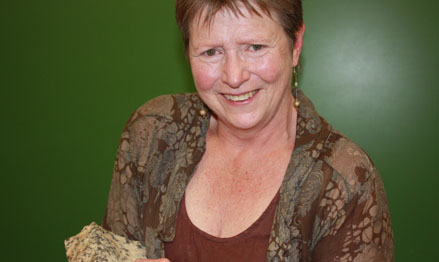Latest News Archive
Please select Category, Year, and then Month to display items
19 November 2018
|
Story Valentino Ndaba
|
Photo Xolisa Mnukwa
 “I’m an embodiment of the dreams of those whose lives have been marked by great struggles,and I want to propel and re-write the African child’s narrative.” - Priscilla Brandt
“I’m an embodiment of the dreams of those whose lives have been marked by great struggles,and I want to propel and re-write the African child’s narrative.” - Priscilla Brandt
Priscilla Brandt, first-generation LLB graduate, saw the opportunity to upgrade her career through the Graca Machel Trust, and grabbed the bull by its horns. Brandt pitched her skills and expertise to one of the trust CEO’s who happened to be part of a GLS panel discussion which was held on the University of the Free State (UFS) Bloemfontein Campus. Shortly afterwards, the organisation contacted her with an offer for a Legal and Governance research internship.
The Graca Machel Trust is an established Pan-African organisation that focuses on child health and nutrition, education, women’s economic and financial empowerment, leadership, and good governance. The trust functions under the leadership of Graca Machel, who is one of the world’s leading advocates for the rights of women and children and has stood as a social justice and political activist for years.
Brandt said her journey started in the township streets of Galeshewe, Kimberley, and was characterised by infinite difficulties and resolute challenges. However, her circumstances in no way deterred her from standing fervently in her trust and pursuit of a full and purpose-driven life.
According to Brandt, her university career involved working at several odd jobs concurrently in order to help take care of her family and to financially maintain herself throughout her varsity years. Despite her adverse circumstances, she managed to collect a vast array of domestic and international academic achievements.
She was the first female chairperson of the Black Lawyers Association Student Chapter at the UFS, served on the UFS F1 Leadership for Change programme, and represented the university in Japan. In addition to that, she formed part of a work and study-abroad programme in America for three months. She was a delegate to the International Youth Leadership Conference in the Czech Republic and was selected by the office of the Commonwealth Secretary General for the 33Sixty Conference in Singapore. Furthermore, she was nominated by the UK Humanitarian Affairs organisation to be part of the eighth University Scholars Leadership Symposium at the United Nations in Thailand.
Her knowledge and belief in her capabilities and work ethic drives Brandt to constantly challenge herself and strive for a life and character that embodies excellence.
Prof Tredoux turns theories regarding the formation of metals on its head
2013-09-17
|
 |
|
Prof Marian Tredoux
17 September 2013 |
The latest research conducted by Prof Marian Tredoux of the Department of Geology, in collaboration with her research assistant Bianca Kennedy and their colleagues in Germany, placed established theories regarding how minerals of the platinum-group of elements are formed, under close scrutiny.
The article on this research of which Prof Tredoux is a co-author – ‘Noble metal nanoclusters and nanoparticles precede mineral formation in magmatic sulphide melts’ – was published in Nature Communications on 6 September 2013. It is an online journal for research of the highest quality in the fields of biological, physical and chemical sciences.
This study found that atoms of platinum and arsenic create nanoclusters, long before the mineral sperrylite can crystallise. Thus, the platinum does not occur as a primary sulphur compound. The research was conducted at the Steinmann Institute of the University of Bonn, Germany, as well as here in Bloemfontein.
Monetary support from Inkaba yeAfrica – a German-South African multidisciplinary and intercultural Earth Science collaborative of the National Research Foundation (NRF) – made this research possible. Studies are now also being conducted on other metals in the precious metal group, specifically palladium, rhodium and ruthenium.
The discovery of the nanoclusters and the combination with arsenic can have far-reaching consequences for the platinum mine industry, if it can be utilised to recover a greater amount of platinum ore and therefore less wastage ending up in mine dumps. This will signify optimal mining of a scarce and valuable metal, one of South Africa’s most important export products.
For Prof Tredoux, the research results also prove thoughts she already had some twenty years ago around the forming of platinum minerals. “Researchers laughed in my face, but the evidence had to wait for the development of technology to prove it.” Young researchers were very excited at recent congresses about the findings, since the new models can bring new insights.
“Chemistry researchers have been talking about platinum element clusters in watery environments for quite a while, but it was thought that these would not appear in magmas (molten rock) due to the high temperatures (>1 000 degrees celsius).”
Prof Tredoux has already delivered lectures at congresses in Scotland, Hungary, Sweden and Italy on this research.
Read the article at: http://www.nature.com/ncomms/2013/130906/ncomms3405/full/ncomms3405.html